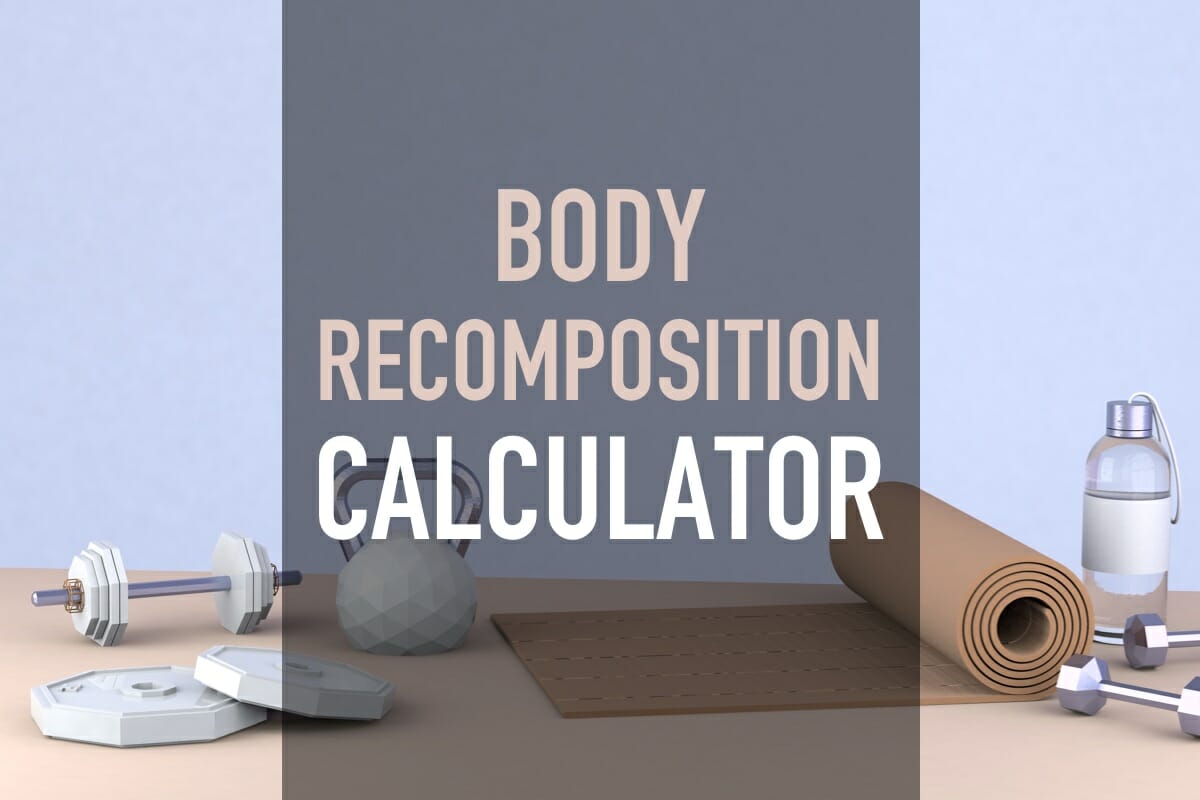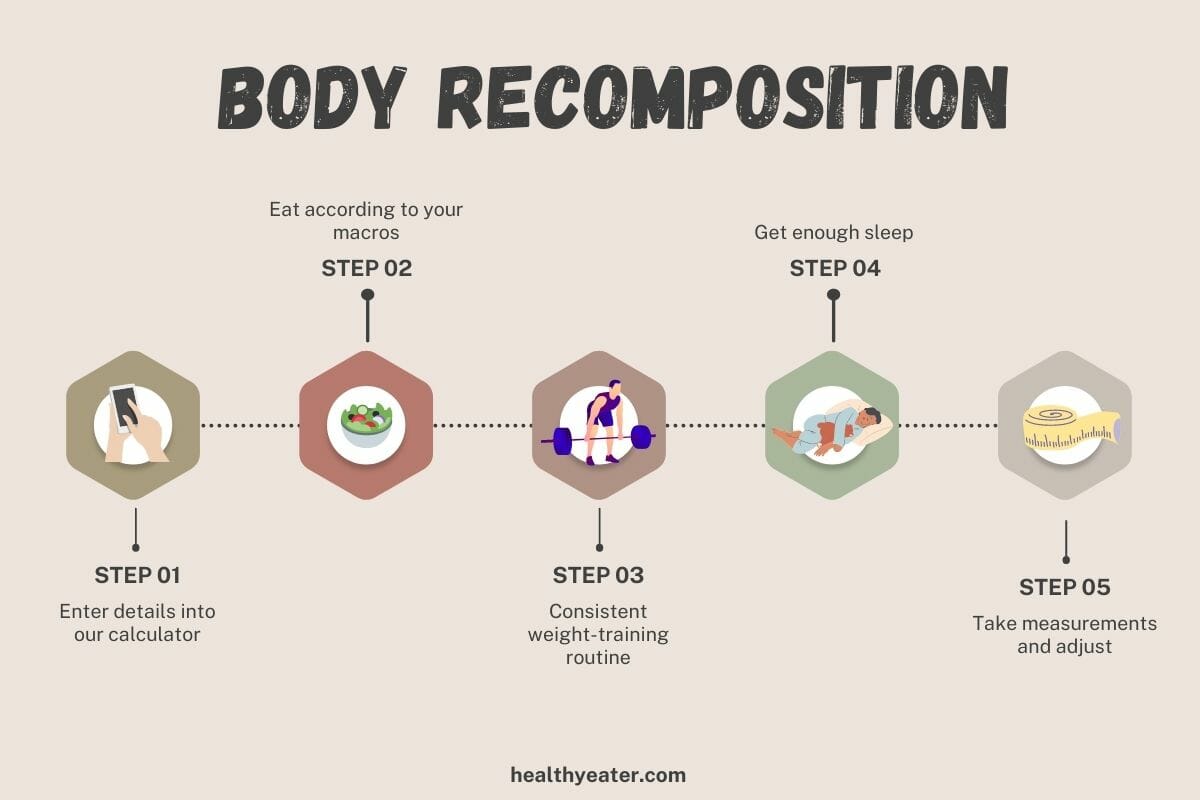Body Recomposition Calculator

Discover the perfect calorie and macro amounts for body recomp – with a 30-second calculation.
What is body recomposition?
Body recomposition is the process of improving your body composition by increasing muscle mass and decreasing fat mass simultaneously.
Favorable body composition has many health benefits and improves athletic performance.
There is ample research-backed evidence showing it is entirely achievable. So believe it!
It requires a commitment to weight training and a nutrition plan.
How to do a body recomposition
Step 1: Enter your details into the calculator
If you know your body fat percentage (calculate here), choose Lean Mass Formula and input your percentage.
The lean mass method yields better results than weight and height alone.
Step 2: Choose your recomposition goal
- If you choose More Fat Loss, there will be less muscle gain.
- If you choose More Muscle Gain, there will be more muscle gain, but probably some fat gain as well.
- If you choose Even – it’s a compromise between the two.
Step 3: Take note of your calories and macros
The calculator will recommend your daily calorie and macro amounts. If you’re new to macros, you’ll need to get up to speed.
You will be told how much carb, protein, and fat you need to eat daily. You can adjust this to show per meal to help you get an idea.
It’s best to eat more on workout days (the increased carbs fuel your workouts) and less on non-workout days. Protein remains relatively constant throughout – as muscle recovery can be happening at any time.
Step 4: Stick to a consistent workout routine.
Consistent workouts are not optional for body recomposition.
Your workouts must be resistance-based, not cardio-based. Do weight-bearing exercises rather than running or walking.
As a basis, we recommend this:
- Have three weight training sessions per week.
- Minimum of 30 minutes per session.
- Focus on compound movements.
For example, squats, deadlifts, pull-ups (or lat pull-downs) – rather than bicep curls, etc. - Rest only 30-60 seconds between sets (i.e., leave your phone at home).
- 3 sets per exercise, 8-15 reps per set.
Step 5: Track your macros
For the maximum chance of success, you will want to track your macros.
This can be tricky.
If you’ve got the budget for it, use Factor Meals who have consistent 500-550 calorie meals. These can form the basis daily meals, you can then add in protein shakes, etc, to meet the required calorie amount.
Step 6: Get enough sleep
It might seem odd, but let’s quote the research:
Sleep deprivation […] seems to create an “anti” body recomposition environment, where building muscle mass and losing FM [fat mass] would be less likely.
Enough said.

How long does it take to recompose your body?
We recommend a minimum of 8 weeks.
Take measurements (fat skinfold tests, photos, etc.) weekly. You can weigh yourself – but that won’t tell you anything about your body composition.
Depending on your results, you will want to adjust your settings.
If you need help, Coach Ted has helped hundreds achieve their goals.
How much protein should I choose?
- The default option (high) is best.
- Maximum is only for those who are doing longer, more intense weight lifting workouts.
- Plant-based protein is set lower: It’s challenging to meet the protein macro without carbs and fats getting too high. If you are vegetarian or vegan, and okay with 1-2 protein shakes per day, then use the default option.
If do extra workouts, do I need to account for the calories?
If you are doing over and above 3 weight training sessions a week, you can account for the extra calories.
- Track your extra calories over a week.
- Be conservative (i.e. don’t overestimate).
- Enter them into the “Additional Weekly Calories”.
The additional energy expenditure will be allocated into the overall weekly algorithm.
If you need help, use the calorie burn calculator. Remember you are looking for extra calories expended over a week.
How many calories should I eat a day for a body recomposition?
There is no one-size-fits-all here. Calories and macros for body recomposition are highly individualized.
Your biological sex, height, weight, and activity level will predict your daily energy expenditure. By making minor adjustments to this, you can begin the process of gaining muscle while losing fat mass.
The technical bits – how to calculate calories for body recomp
- Apply the Mifflin-St Jeor equation to calculate your basal metabolic rate.
- If you know your body fat percentage, use the Katch-Mcardle formula.
- Multiply BMR by 1.2 to get your maintenance calories.
- Adjust the calorie amount for training days based on the goal:
+20 % for more muscle gain and +10% for more fat loss. - Adjust calorie amount for rest days based on the goal:
-5% for more muscle gain, -15% for more fat loss. - Calculate protein amount
0.95 grams protein / lb (~2 g / kg) of body weight is the default. Plant-based is 0.65 g/lb. - Calculate fat amount.
Calculate fat at 30% of daily calories. - Calculate carb amount.
All remaining calories are allocated to carbs.
Yes 🤓. That’s why we made a calculator.
Is this the same as the macro calculator?
No, there are many differences.
The standard macro calculator is aimed at people wanting to lose weight, and exercise is optional.
There are differences in both the calorie calculation step and macro calculation step.
How much cardio for a body recomposition?
The traditional bodybuilding method involves a ‘bulk’ phase (lots of calories + heavy weights), followed by a ‘cutting’ phase (reduced calories + lots of cardio).
Body recomposition is a different process. Cardio alone (such as steady-state running or walking for 20 mins+) won’t increase muscle mass.
You should keep cardio to a minimum. However, it’s good for the heart and mental health, so don’t give up going for bike rides or walks if this is your thing.
It’s a good idea to account for the extra energy expenditure from cardio.
If you burn a lot of calories through cardio, you will not achieve the desired body recomp results. You are not doing a body recomposition!
Help! I’m not getting the desired results
- “I’m gaining some muscle but not losing fat“
Adjust calories down lower. - If your goal is Even, change it to More Fat Loss.
- Are you eating more on workout days? And less on non-workout days?
Accelerate Your Diet and Fitness Goals with My Macro Solution System
Step-by-step self-guided program -or- fully customized personal macros coaching. Feel exhilarated as you conquer your goals!
MACRO COUNTING
- 130 page step-by-step guide.
- Achieve fat loss without starvation.
- Individually tailored to your body composition.
References
- Barakat, C., Pearson, J., Escalante, G., Campbell, B., & De Souza, E. O. (2020). Body recomposition: can trained individuals build muscle and lose fat at the same time?. Strength & Conditioning Journal, 42(5), 7-21. (full text)
- Ribeiro, A. S., Pereira, L. C., Schoenfeld, B. J., Nunes, J. P., Kassiano, W., Nabuco, H. C., ... & Cyrino, E. S. (2022). Moderate and Higher Protein Intakes Promote Superior Body Recomposition in Older Women Performing Resistance Training. Medicine and science in sports and exercise.Link
64 Comments

 Calorie Deficit Calculator
Calorie Deficit Calculator Body Recomposition Calculator
Body Recomposition Calculator Macro Calculator
Macro Calculator Calories Burned Calculator
Calories Burned Calculator Keto Macro Calculator
Keto Macro Calculator
SIR U DO VERY GOOD JOB….👍👍👍
Hi I was just wondering does how many calories you burn count for how many calories you should eat, or we shouldn’t be worry about how many calories we are burning.
Hi Luna, the calculator takes into account energy expended from a typical resistance training regimen. If you are doing a lot more exercise than this, daily calorie intake will need to be increased.
By how much
Use the calorie burn calculator to get try and nail down specific calories.
I average around 6,000 steps a day.
Should I eat slightly lower since I don’t get 10,000 steps a day
Is this in addition to your strength training?
Yes in addition to my training sessions (4x a week) 5 exercises 3-4 sets
In another response James mentioned added 150cals per 10,000 per day.. so if you’re at 600 that would be 90 extra cals per day.. 630cals added. If that helps at all 🙂
Thank you so much for this incredible resource.
Here is a breakdown of my situation: so I have basically been on crash diets for too long. Now, I have started eating back at maintenance. I lift weights 5x week, tons of volume (6-8 reps, lots of compounds) and I hit an average of 10-15k steps a day, with some days going over (not because of cardio, I just love walking).
I estimate that my maintenance calories are at around 3100, if I am not mistaken (BMR, EAT, NEAT and TEF). As I started increasing them, from 2100 to 2800, I immediately noticed much more energy.
I am thinking about recomping at 2550-2600 every day for the same amount of activity. My body fat is around 13-14%, I am 5’11”(177cm) and I weight 173lbs (77-79kg). Can this be okay?
With that level of activity, I wonder if there is enough recovery time. Muscles are built during rest. The best thing you can do is to carefully measure your results and adjust accordingly.
I have a desk job and I usually sleep 8-9 hours at night. I enjoy doing long walks more for pleasure rather than as workout. Anyways, I am tracking my activity with fitness bands, and adjusting it to more calories.
hi if im training 4 times a week , every exercise is 90-110 minutes ,
which adjustments do i need to do?
Your daily calories would be slightly higher given the extended length of your workouts. We are working on a tweak to the calculator to allow for people who opt for more intensive workouts.
Why are carbs higher than fats? I eat mainly plant proteins but some chicken/fish a couple and find it hard to meet protein goals without fats. Will this stall progress? Thanks
Carbs are an essential part of fueling solid workouts. It can be challenging to meet protein goals without going over on other macros. This is where protein shakes can help out. Provided you keep in the right calorie amounts, some variation in macros is ok.
Can I still apply this method if I train 4 days on 1 day off?
Hi Leon, yes but your day off should be adjusted down since you aren’t working out.
Thank you for making this calculator! Can I ask why the plant-based protein is lower? I am vegan but I’ve still been aiming for about .08-1g of protein per lb of bodyweight (120-150g) for me but the calculator is saying I only need 98g. Why less plant-based protein compared to animal protein? Thanks in advance.
Hi Andy, Glad you found it useful. The protein is lower because it’s really difficult to get that much plant-based protein from whole food sources without your carbs and fat getting out of range and therefore your overall calories without a lot of protein supplementation. If you’re ok with a couple of protein shakes a day, then feel free to use the higher protein amounts but for many vegans lower protein is easier to achieve and is still more than the RDA minimum needed.
Thanks for responding so quickly! That’s really helpful. I agree, I find it easy enough to hit the 120g lower range I was aiming for but if I aim for the 150g I definitely struggle to keep overall calories down. I don’t mind protein shakes to help though. I just want to make sure getting enough and wasn’t sacrificing muscle gain I guess. We’ve always been told plant-protein is inferior to animal protein so was curious why could get away with less protein on a plant-based diet.
You’re welcome. Luckily we have a lot of great examples of vegan athletes and vegan bodybuilders that show us that you can get enough needed protein from plants and we probably don’t need quite as much as what’s generally recommended by the majority of the fitness community.
As someone who lost a lot of weight before by eating wayyyy too little calories, very low carb, lots of cardio/weights. I gained most of the weight back but do have a lot of muscle mass. Since I am upping my calories now, will I see a huge jump up on the scale even if I am sticking to my weight training 4/5 times a week?
Hi Haley, I would recommend that you start slow with the increases and gradually work your way up. Start with more fat loss and then evaluate every two weeks.
Hi, This is a solid resource – thank you.
Imagine you have to also take into account cardio, walking for a few hours etc and add to the calories per day depending on the goal / tweaks?
Also protein amount – maximum is for satiation and extra help for hard gainers?
Hi Scott, Thanks glad you find it useful. Yes, you should account for all purposeful exercise. Max protein would be for those that spend a lot of time weight training and therefore have a lot of protein turnover. If you’re only lifting 45-60 minutes then lower protein amounts are adequate.
I love this calculator is there a way to add in the option for breastfeeding? I think we should be consuming more calories but what if I’m breastfeeding and want to recomp?
Hi Luz, Coach Ted has written quite a bit about this here. Essentially, around 400 calories are added to the daily amount when breastfeeding.
Hi-
Do we vary calories during training vs rest days for body comp? I ask because i’ve been following the macros using this calculator for a month and i noticed a couple pounds of increase in my weight and some muscle which is great. However, I’m not seeing any reduction in body fat. Current macros 1740 ( P120, F45, C214) on training days and rest days 1608 (P120, F53, C161)
Hi Nina, Great job on the muscle gains. Yes, you want to vary your days based on how active you are. If you are gaining muscle but not losing fat then you need to lower your calories a tad.